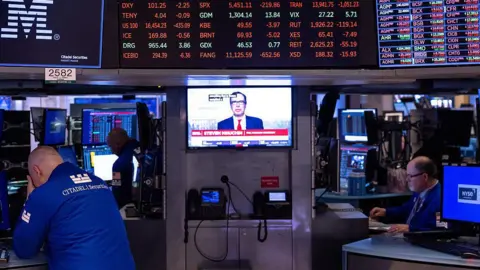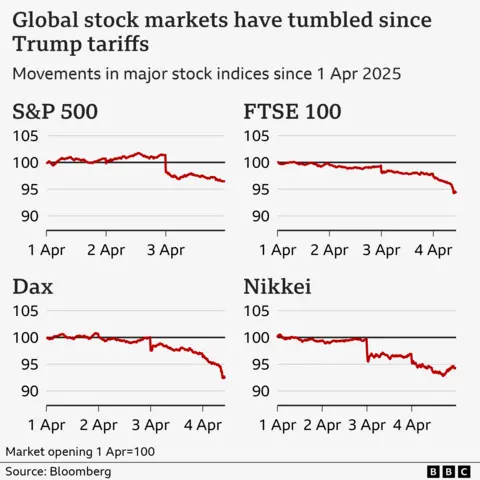Tom Espiner
Business reporter, BBC News

 Getty Images
Getty Images
Global stocks have slumped further after China hit back at US import taxes with retaliatory tariffs of its own.
The main US indexes opened down nearly 3% while European markets were about 4% lower, with some companies seeing double-digit falls in their share prices.
The declines add to large falls seen on Thursday as markets continued to react to the uncertainty triggered by the US tariffs.
Traders are concerned the tariffs will increase prices and weigh on growth in the US and abroad.
The news that China will add a 34% tariff on US goods from 10 April has increased fears of a drawn out trade war.
China's finance ministry says the US tariffs on Chinese products are "not in line with international trade rules".
When the sweeping new tariffs were announced by US President Donald Trump on Thursday, China was hit with a 54% rate, which include previous duties already in place. That makes China one of the hardest-hit countries on America's tariff list.
In the US, the tech-heavy Nasdaq opened down 2.8% on Friday, but it fell into what is known as "bear territory" - that is, it may close more than 20% lower than its recent peak in December.
The Dow Jones was more than 2% lower while the S&P 500 fell nearly 3%.
Shares in tech giant Apple fell more than 3%, and have dropped 12.5% over two days. It outsources much of its production to China, which faces an aggregate 54% US tariff rate.
In Europe, the FTSE 100 index was down 4.6% while in Germany the Dax was 4.4% lower.
Russ Mould, investment director at AJ Bell, said the "relentless selling" had continued despite investors "hoping the pain would go away".
"There are so many moving parts that getting your head around the situation [as an investor] isn't easy," he said.
"With countless sectors set to be hit by tariffs, it's difficult to know where to begin to comprehend the situation."
Jane Sydenham, investment director at Rathbones, said banking stocks, firms with supply chains that were exposed to tariffs, and tech stocks had all been falling.
Investors had been buying into safe haven assets including gold and government bonds, she said.
Gold was above $3,121 an ounce on Friday, back near record highs, while bond yields were down, according to Trading Economics.
China had been "under severe pressure" to respond to tariffs of 54% on most goods, Ms Sydenham said, and its economy was big enough to be able to take such action.
But countries with smaller economies were having to be more cautious, she added.
Leah Fahy, China economist at Capital Economics, said the country had "hit back hard" against US tariffs.
She said the "aggressive, escalatory" response "makes a near-term deal to end the trade war between the two superpowers highly unlikely".


The dollar index, which measures the value of the US currency against six peers, had sunk 1.9% on Thursday, the sharpest drop since November 2022, but on Friday it steadied, rising by 0.35%.
Oil prices fell sharply as traders worried that the tariffs could slow economic growth and worsen trade disputes.
The price of a barrel of Brent crude slumped more than 6% to $65.35 a barrel.
The managing director of the International Monetary Fund (IMF), Kristalina Georgieva, has said the new tariffs "clearly represent a significant risk to the global outlook at a time of sluggish growth".
She said the IMF was still looking into the "macroeconomic implications" of the measures and stressed the need to avoid actions that could do more damage to the global economy.

 Movie
Movie 2 months ago
84
2 months ago
84 




![Presidents Day Weekend Car Sales [2021 Edition] Presidents Day Weekend Car Sales [2021 Edition]](https://www.findthebestcarprice.com/wp-content/uploads/Presidents-Day-Weekend-car-sales.jpg)



 English (United States)
English (United States)